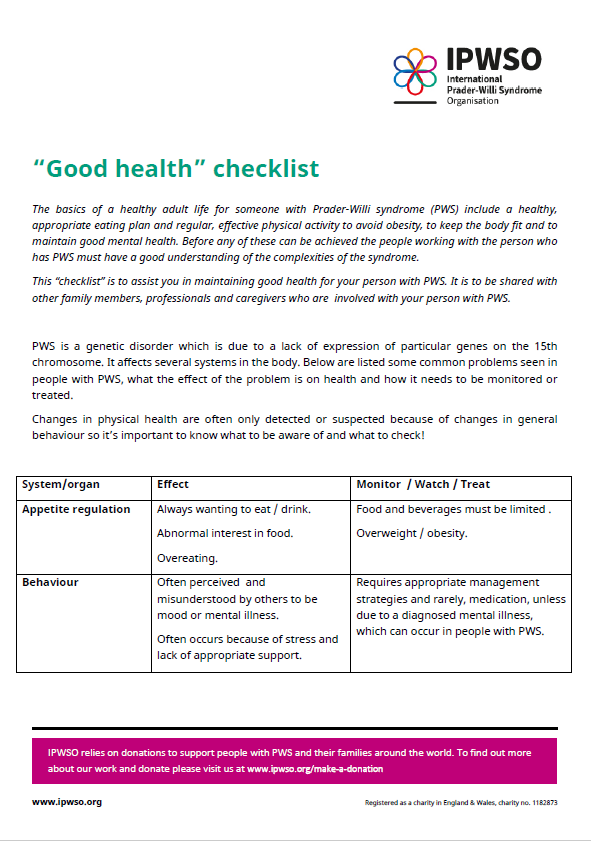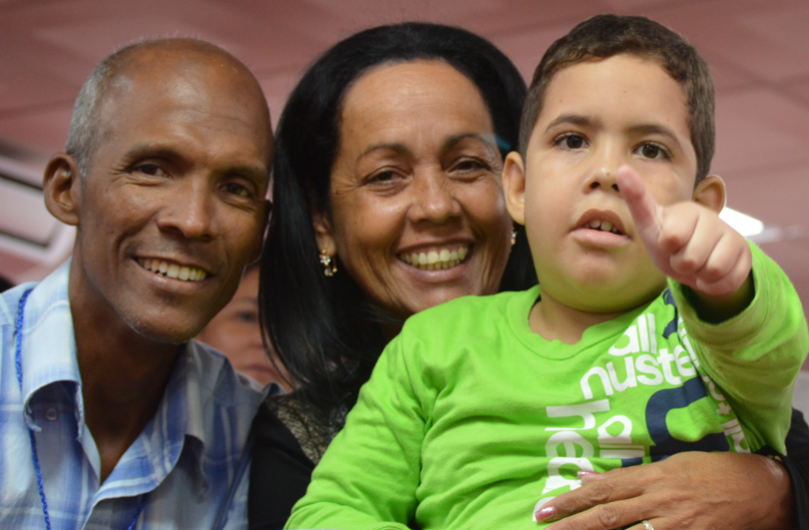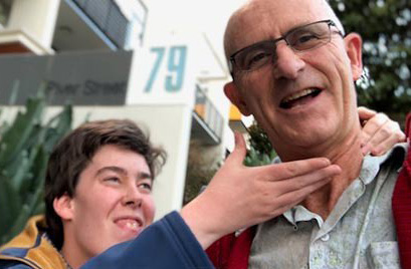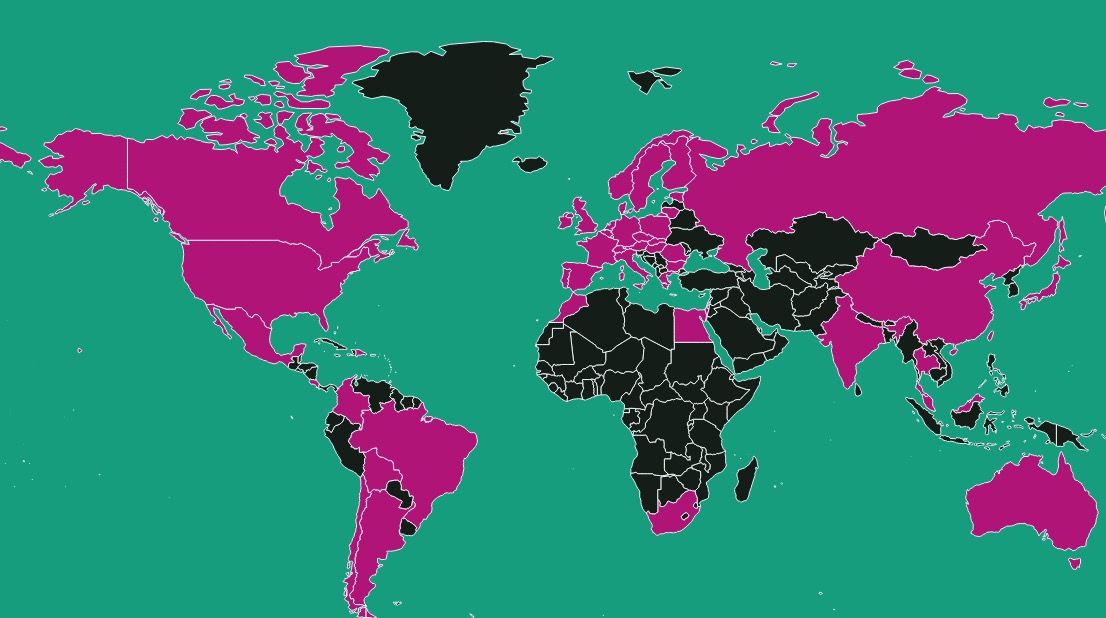Physical Health and Exercise
An early childhood diagnosis of Prader-Willi syndrome (PWS) usually provides parents with the opportunity to learn strategies to manage potentially difficult behaviour and obesity. Despite variable intellectual and physical abilities, it must be remembered that a cognitive disability, hunger and reduced satiety remain with the person with PWS throughout their lives. The ability to make appropriate independent decisions regarding energy intake and choices of life rarely eventuates, even as the child with PWS becomes an adult. It will always remain the responsibility of their parent or carer to make healthy choices and maintain firm boundaries around food, money, exercise and lifestyle.
The Basics of a Healthy Adult Lifestyle
Energy Needs
Adults with PWS still need a limited energy intake – of about 60% of the daily recommended energy intake for non-PWS adults. Remember the caloric intake guide: 29 kJ or 7/kcal per centimetre of height (75.5 kJ or 18 kcal/inch) if they need to lose weight or (33.5-46 kJ or 8-11 kcal per centimetre of height (84-117.6 kJ or 20-28 kcal/inch) for weight maintenance. This does not change and applies to people with PWS of all ages. Throughout this page the term “energy” refers to the kilocalories – kcal (or kilojoules – kJ) obtained from the food and beverages consumed.
How is this energy intake achieved?
Restricting energy consumed requires a consistent balance of meals and snacks. This means all extra food sources need to remain inaccessible to the person with PWS. Kitchens, pantries, refrigerators, food cupboards, fruit bowls, garbage bins, shops, relatives’ homes, friends’ homes, neighbours’ homes, work places, day programmes, food courts, shops, church functions, sporting events and independent travel all provide the opportunity for “extra” energy intake. Most people with PWS will take food or money to buy food, or eat leftover food or scraps from garbage bins, if given the opportunity. This is because they are constantly thinking about food and not satisfied by the amount they consume. This is a trait of PWS, not a personality trait of the person with PWS. A consistently secure environment coupled with psychological ‘food security’ is essential to achieve emotional and behavioural stability.
People with PWS certainly need choice and variety in the food they eat and what they drink but the calorie content must be determined according to their needs. The more constant the restrictions are, the better the person with PWS will adapt to the restrictions. Also, it is extremely important to maintain restrictions once they are in place. This is not only to maintain a healthy weight but also to avoid over-consumption that could lead to severe gastric health problems.
Calorie Bargaining
This practice involves reducing the usual energy intake for a few days prior to a party or similar irregular or special event, where higher energy food will be consumed. It is a useful strategy that enables greater “socialising” while managing the extra calories to avoid weight gain. For example: reduce the quantity of meat or remove the carbohydrate from the evening meal for 2-3 days prior to an event to allow for the extra calories consumed at the party. Even if the reduction in calories does not equate exactly to what is consumed at the event – the strategy implies an energy control. Offer the person the choice to attend the event and “calorie bargain” or avoid the event. He/she may choose not to go to the event so they don’t have to reduce their usual intake. Calorie bargaining gives them a choice, while retaining a constant energy input. It also helps to keep in place “mental security”. It requires prior explanation and discussion with your person with PWS and does not suit everyone. Whether you practise calorie bargaining or not, remember, it is always best if energy consumed out of home is discussed, planned for and chosen, before the event, wherever possible.
A parent writes: in our home we follow the practice of “food or portion bargaining”. Our daughter with PWS eats what we eat and we concentrate on low fat, low carbohydrate meals with lots of vegetables and adequate fruit. When our daughter asks for another serving of food – she is happy with my response of “no, I will keep it for you to have tomorrow.” When we eat out, if possible, we discuss what food will be served and she is reminded that “I’ll dish it up for you.” She has a small portion of dessert, if it is served, and if she asks for more our strategy is to ask the host for a portion to take home with us for her to have the next day or later in the week, as a treat. She is also prepared to reduce her next meal that follows the outing meal.
The above strategies work well as a result of consistently practising them in the same way each time, so trust is established between the person with PWS and his/her family member. In many cases something that is stored for later, is not even asked for again.
Another parent writes: when we eat out our “rule” is that she will ask for a take home box when she orders her food, and then I put half of the food into the box before she starts to eat. She knows that the other half will go home with us and she can have it the next night for dinner. For her, this is like eating out two nights in a row. We have not had any problems with this and it works beautifully for her.
People outside the family unit also need to know about PWS so they can support and assist you in the healthy strategies you practise for your person with PWS. When people you have contact with are well-informed they can often feel less apprehensive about being with the person with PWS. The knowledge can empower them to understand the nature of PWS a little better.
Exercise – energy output
All people with PWS require regular effective exercise, as much as energy restriction, throughout their lives. People with PWS have more fat and less muscle. Their muscles have reduced tone and are weaker, which reduces joint stability, agility and bone strength. Exercise is the key to weight management, cardio-respiratory fitness, muscle strength and joint stability, bone health, mental health and the prevention of diabetes for all people but so important for people with PWS. Exercise also provides a distraction from focusing on food, develops emotional well-being, boosts self esteem and improves behaviour.
If your person with PWS is not exercising – now is the time for them to start. It is never too late! If they are only able to walk short distances then this is their starting point. Walking 10 minutes twice a day is a great start! The secret is to manage their routine to include some physical activity every day. The aim is to eventually have them doing 30-40 minutes of aerobic type exercise 5-6 days per week. Examples of exercise include: walking, swimming, cycling, dancing, rowing and similar continual exercise. When first introducing a new activity or exercise, a small reward for the completion of a planned exercise can be a good incentive. A planned meal or snack can be used as a routine reward for completed exercise. Exercising before eating or waiting for one hour after eating is recommended except when the person is known to have delayed gastric emptying. Then it’s best to exercise immediately after eating to assist digestion. When introducing exercise explain that as the exercise becomes easy the intensity will gradually be increased to make them stronger. To improve fitness, the intensity or duration of the exercise should be increased very gradually. Also remember to warm-up and cool-down. Exercising in the morning has additional benefits: increased alertness, it’s done and out of the way, the person is not as tired as at the end of the day.
Incidental or purposeful activity is also important. Household chores like making the bed, hanging out washing, collecting mail and helping with domestic responsibilities not only keeps them active but may also improve their self esteem as you entrust them with family jobs. Adults like to be needed and given responsibilities to prove their ability. Mastery and praise can work wonders!
Where possible, it’s even better if family members can join in the exercise so it is seen to be good for everyone, not just the person with PWS. Once exercise is a regular part of their day, less encouragement is required as it becomes a part of their consistent routine.
Outdoor activities are a wonderful way to combine energy expenditure and the many benefits gained from being outside. Sunshine is the essential source of Vitamin D! Walking on different terrains or surfaces also increases muscle strength. Taking in the sights and sounds of nature when in parks, forests or country areas can be educational and stimulating to the senses and mind. Walking is one of the best activities for sensory motor stimulation in adults with PWS!
A parent writes: for my son walking outdoors is a noticeable anti-depressant and mental health aid. Getting sunlight into the eyes, moving around other people, deciding which path to take, hearing birds and seeing insects, having something different to talk about makes being active outdoors all worthwhile. Where possible, involve others in the life of your person with PWS. Positive friends, neighbours and other family members enrich their lives. A simple “hello” or smile or “how are you going?” are positive interactions for people with PWS, who generally have difficulties with friendships and community socialisation.
Encourage as wide a range of interests as possible!
Each person will naturally be inclined towards certain interests but “expanding their horizons,” when possible and appropriate, has benefits. Encourage reading, writing, craft activities, interest in world events and different sports. Just be mindful of the availability of extra calories at any event attended and discuss the management of this beforehand. Being employed in an active way takes up another opportunity to expend energy in a way that is “part of the working day” rather than an uncomfortable chore. If they are being paid to be active this is even better!
A parent writes: the only thing that really has worked for our daughter regarding exercise and sticking to it, has been a junk-mail run that is she currently doing. It takes her two hours, and she gets paid a very minimal amount (but anything’s better than nothing). Being paid for a “job” has given her not only the encouragement to stick at it, but the ability to say that, yes, she has a job! Amazingly, she goes out in all weathers. Amazingly, she has stuck with it, and amazingly, she has lost 10 kg in 5 months!
Dressing appropriately
We talk about “dressing for the weather” but must remember that people with PWS do not have this ability. Parents and caregivers are their weather guides and need to encourage their people with PWS to dress appropriately for the weather – regarding clothes and shoes. People with PWS can suffer from hypothermia and hyperthermia when not dressed accordingly for the temperature.
When your person with PWS is exercising or being regularly active, be aware of any injury or pain that may cause greater problems in the future and reduce their ability to exercise. Skin picked sores on the legs or stomach may be exacerbated during exercise if they are rubbed by clothing. They may need to be covered and protected to prevent infections developing. Wearing appropriate shoes for exercise may need to be pre-negotiated. When someone with PWS has favourite shoes and is not keen to wear “joggers” these may prevent the person from exercising safely or adequately. Appropriate exercise shoes don’t need to be expensive but do need to be supportive and protective, especially if the person had diabetes.
A good shoe for exercising in:
- has a flexible sole and a good arch support
- allows for expansion of the feet as they warm up (laces are better than velcro straps)
- has a good heel support
It’s never too late to introduce exercise to your person with PWS. It may take some persistence on your part to encourage regular exercise, but if you can add it to their daily routine and make it an enjoyable experience or one that is rewarded in some way the benefits will certainly out way the initial difficulties. Exercise is not an optional extra for people with PWS. It is as important as a restricted energy intake.
Be aware as your person with PWS settles into a regular exercise routine – things may change: they may have more energy, they may be happier, they may become healthier!
A positive experience can lead to positive results for all involved.
This article was written by IPWSO’s Famcare Board.
- Adults with PWS still need a limited energy intake – about 60% of the daily recommended energy intake for non-PWS adults 60%
- Adults with PWS still need a limited energy intake – about 60% of the daily recommended energy intake for non-PWS adults 60%
A Guide to Health Checklist
The basics of a healthy adult life for someone with Prader-Willi syndrome (PWS) include a healthy, appropriate eating plan and regular, effective physical activity to avoid obesity, to keep the body fit and to maintain good mental health. Before any of these can be achieved the people working with the person who has PWS must have a good understanding of the complexities of the syndrome.
This “checklist” is to assist you in maintaining good health for your person with PWS. It is to be shared with other family members, professionals and caregivers who are involved with your person with PWS.
Importance of Exercise for People with Prader-Willi syndrome
General Health in Prader-Willi syndrome
Personal Care for People with Prader-Willi syndrome
< Back to Information for Families
International Community
IPWSO was established so that PWS associations, families, clinicians and caregivers around the world could exchange information and support and have a united global voice under one umbrella.
Information for Medical Professionals
The latest medical and scientific research and information, plus guides into common medical issues affecting people with PWS.
What is PWS?

Prader-Willi syndrome is a complex genetic condition. Various studies have shown that between 1 in 15,000 to 25,000 children are born with Prader-Willi syndrome and it affects all races and both sexes equally.
Free Genetic Screening

If you suspect your patient has Prader-Willi syndrome, based on the clinical signs and symptoms, but are unable to access testing in your country, then you may be able to access free genetic screening.





